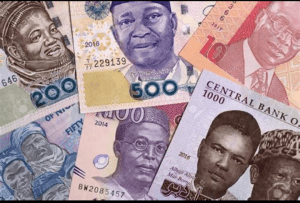Global trade war: Naira value depreciates amid forex outflows
The naira has continued its downward slide against the dollar, driven by global economic uncertainties, foreign exchange (FX) outflows, and reduced dollar supply in Nigeria’s forex market. Over the past two weeks, the local currency has depreciated sharply, hitting its lowest level in five weeks despite intervention efforts by the Central Bank of Nigeria (CBN).
Global Uncertainty Fuels FX Outflows
The ongoing tariff war between the United States and key global economies—including Canada, Mexico, China, and the European Union—has triggered uncertainty in global markets. The situation escalated last week when the U.S. imposed a 25% tariff on all metal imports, prompting retaliatory measures from affected countries.
Fears that the trade war could lead to inflationary pressure and a potential global recession have unsettled investors, causing massive sell-offs in stock markets worldwide. Reflecting this trend, the MSCI World Index, which tracks stocks from 23 developed countries, declined by 2.1% last week. Nigeria’s stock market (NGX Exchange) was not spared, recording a 0.5% loss for the second consecutive week.
Amid the uncertainty, foreign investors have begun pulling funds from Nigeria. Many portfolio investors are offloading assets—including bonds, treasury bills, and equities—to move their capital into safer, more liquid investments. A senior banking executive confirmed that this sell-off has created additional demand for dollars in the forex market, leading to increased pressure on the naira.
Naira Depreciation Worsens in Parallel and Official Markets
The naira has faced sustained depreciation in both the official and parallel markets over the past two weeks. In the parallel market, it weakened by N55 to close at N1,600 per dollar, marking a 7.4% depreciation from its February 26 level of N1,490 per dollar.
Similarly, in the official market, the currency declined by N6 to N1,548 per dollar, a 3.3% depreciation from its previous rate of N1,499 per dollar.
The increased demand for dollars, combined with fears of further naira depreciation, has led to panic buying, further worsening the situation.
CBN’s $500 Million Intervention Fails to Halt Slide
In an attempt to stabilize the forex market, the CBN injected $500 million last week to boost dollar supply. However, this intervention was not enough to counterbalance the growing FX outflows and demand pressures.
Market analysts believe the naira’s continued slide is a result of limited FX supply, speculative trading, and dwindling confidence in the local currency.
Weak Dollar Supply Compounds the Crisis
Currency dealers in the parallel market have attributed the sharp depreciation of the naira to a weak supply of dollars, stemming from a combination of factors.
A Bureau de Change (BDC) operator disclosed that commercial banks have stopped selling the $25,000 weekly allocation to BDCs, citing a lack of available dollars. “They sold to us for a while, but stopped two weeks ago. Now, they say they are reviewing the rate. That’s why you see the dollar going up,” he said.
Mallam Tijani Yusuf, a parallel market dealer, confirmed the rapid depreciation. “I sold a dollar for N1,600 today, compared to N1,400–N1,500 two weeks ago. The pressure has increased sharply, and supply is not keeping up,” he noted.
Another dealer, Mr. Farouk Yahaya, explained that many sellers now prefer dealing with banks instead of the black market. “People no longer sell their dollars to us because banks offer competitive rates and credit their accounts directly. This has reduced the supply available in the parallel market.”
Experts Call for Urgent CBN Intervention
With the naira at risk of further depreciation, financial experts have called for urgent intervention from the CBN to restore stability.
Aminu Gwadabe, President of the Association of Bureaux De Change Operators of Nigeria (ABCON), emphasized the need for consistent dollar supply to curb speculation and market volatility.
“The naira’s regression is worrisome. While the usual demand-supply imbalance plays a role, other factors like speculative trading and low confidence in the naira’s value are exacerbating the problem,” he said.
Gwadabe urged the CBN to maintain its market-stabilizing role through sustained interventions. He also called for increased oversight on banks’ dollar sales to BDCs and clearer communication on policy direction to prevent speculative activities.

Outlook: Will the Naira Slide Further?
The outlook for the naira remains uncertain. Currency traders predict that if the current trend continues, the exchange rate could hit N1,680–N1,690 per dollar, or even N1,700 in a worst-case scenario.
Unless the CBN implements more aggressive measures to improve FX liquidity and restore investor confidence, the naira may face continued pressure in the coming weeks.
Read Also: “N70:000 Wage” Obasanjo Accuses Labour Leaders of Betrayal


